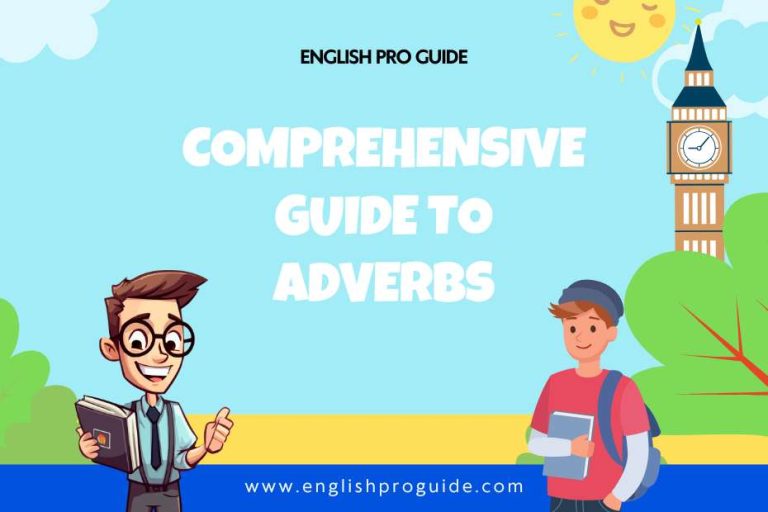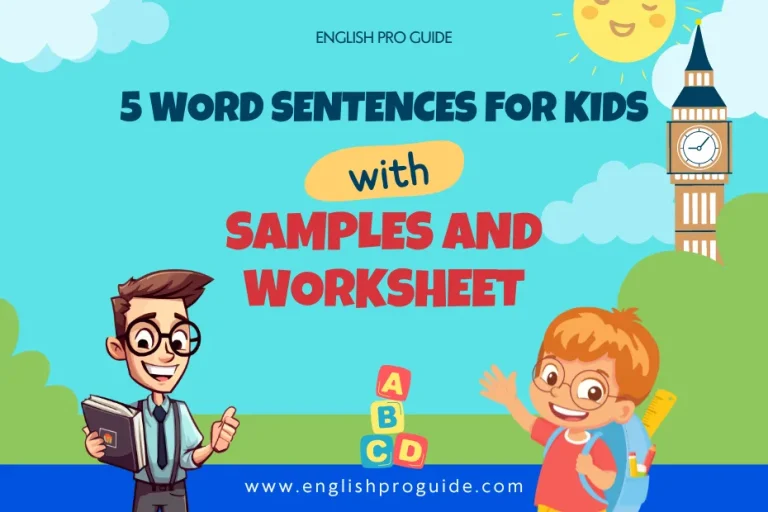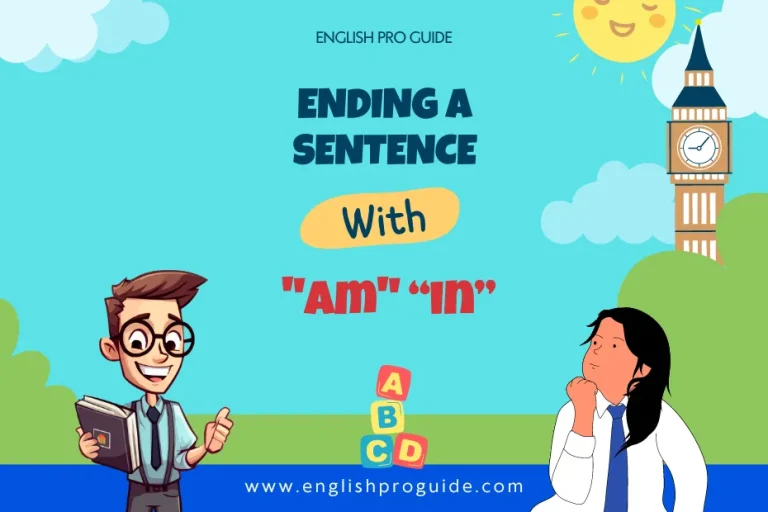100 Proper Nouns: Examples and Tips for English Learners
If you’re learning English and want to sound clear and confident, learning proper nouns is a smart start.
Proper nouns are special names that make your sentences meaningful and exact. From people and cities to holidays and brands, they help you talk and write with confidence.
In this guide, you’ll learn what a proper noun is, why it matters, and how to use it correctly—with 100 real examples and easy practice tips.
What is a Proper Noun?
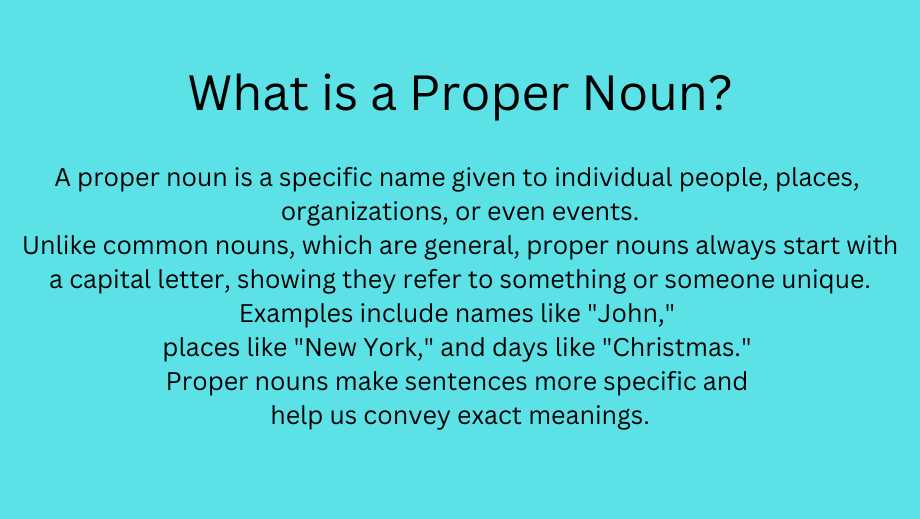
What Is a Proper Noun?
A proper noun is a specific name given to a person, place, organization, or event.
Unlike common nouns, which name things in general (like city or river), proper nouns name something unique (like Paris or Nile).
Rule: Always start proper nouns with a capital letter, no matter where they appear in a sentence.
Examples:
- John loves New York.
- Christmas is my favorite holiday.
Why Learning Proper Nouns Is Important
Learning proper nouns helps you:
- Speak and write clearly.
- Show respect by naming people or places correctly.
- Avoid confusion when talking about something specific.
For example:
- Saying “He lives in city” is unclear.
- Saying “He lives in London” gives clear meaning.
That’s the power of proper nouns—they bring clarity and detail to your English.
Read More: Short Rhyming Poems That Are Funny For Kids
Two Simple Examples of Proper Nouns in Sentences
- Maria loves spending her weekends in Paris.
- The company Google has changed the way we search for information.
Here, “Maria,” “Paris,” and “Google” are all proper nouns because they name a specific person, place, and brand.
5 Common Proper Nouns You Should Know
Here are five examples you’ll often see in daily English:
| Proper Noun | Category | Meaning |
|---|---|---|
| Amazon | Company | A famous online marketplace |
| Michael | Person | A common male name |
| London | City | Capital of the United Kingdom |
| Monday | Day | The first day of the week |
| Thanksgiving | Holiday | U.S. celebration of gratitude |
Try using each in your own sentences to get comfortable.
Types of Proper Nouns in English
Proper nouns appear in many forms. Here are the main types:
- People’s Names: Emma, David, Sophia
- Places: Asia, Canada, New York
- Brands and Companies: Apple, Nike, Toyota
- Days and Months: Sunday, October
- Events and Holidays: Christmas, Olympics
- Organizations: NASA, WHO, UNICEF
Knowing these types helps you recognize them quickly while reading or writing.
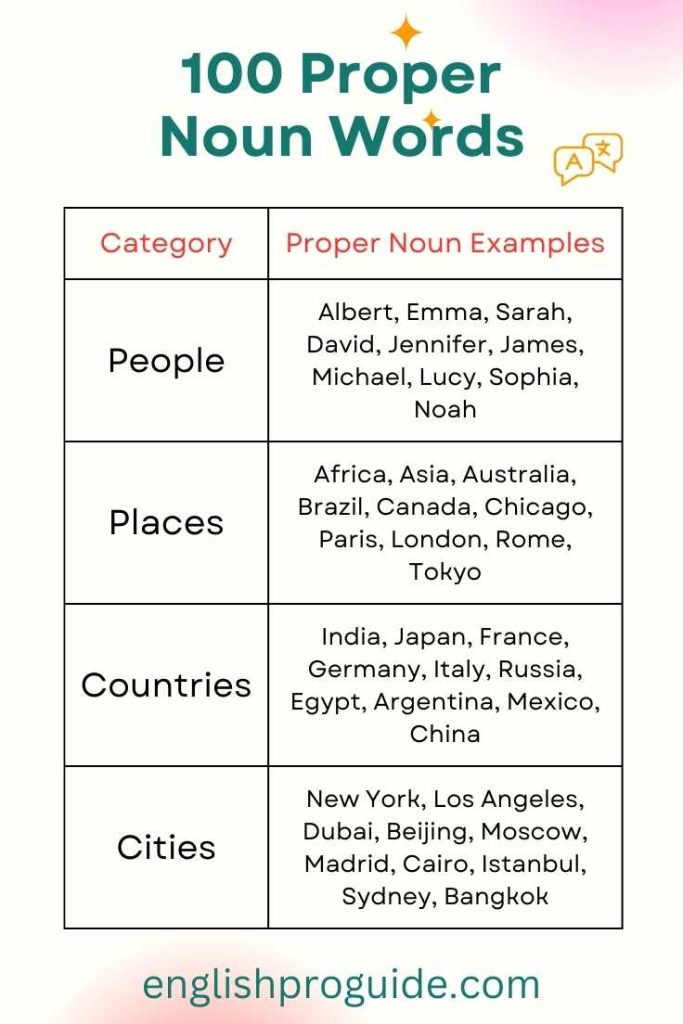
100 Proper Noun Examples (With Categories)
Below is a complete list of 100 examples of proper nouns, organized by category.
Use this list to build your English vocabulary and improve your writing skills.
| Category | Proper Noun Examples |
|---|---|
| People | Albert, Emma, Sarah, David, Jennifer, James, Michael, Lucy, Sophia, Noah |
| Places | Africa, Asia, Australia, Brazil, Canada, Paris, London, Rome, Tokyo |
| Countries | India, Japan, France, Germany, Italy, Russia, Egypt, Argentina, Mexico, China |
| Cities | New York, Los Angeles, Dubai, Beijing, Moscow, Madrid, Cairo, Sydney |
| Landmarks | Eiffel Tower, Big Ben, Statue of Liberty, Great Wall of China, Colosseum |
| Rivers | Nile, Amazon, Mississippi, Yangtze, Ganges, Thames, Danube |
| Oceans & Seas | Pacific Ocean, Atlantic Ocean, Indian Ocean, Mediterranean Sea |
| Continents | North America, South America, Europe, Africa, Asia |
| Planets | Mercury, Venus, Earth, Mars, Jupiter, Saturn, Uranus, Neptune |
| Brands | Apple, Samsung, Nike, Coca-Cola, Pepsi, Google, Microsoft |
| Companies | Starbucks, McDonald’s, Sony, Intel, IBM, Disney |
| Days of the Week | Monday, Tuesday, Wednesday, Thursday, Friday, Saturday, Sunday |
| Months | January, February, March, April, May, June, July, August, September, October, November, December |
| Holidays | Christmas, Thanksgiving, Halloween, Easter, New Year’s Day |
| Mountains | Mount Everest, K2, Mount Fuji, Rocky Mountains |
| Organizations | NASA, UNICEF, WHO, NATO, UNESCO, Red Cross |
| Publications | The New York Times, The Guardian, Forbes, National Geographic |
| Famous People | Albert Einstein, Elon Musk, Shakespeare, Nelson Mandela |
| Events | World Cup, Olympics, Super Bowl, Tour de France, Cannes Film Festival |
Common Mistakes with Proper Nouns
Here are a few errors English learners often make — and how to fix them:
❌ I visited paris last year.
✅ I visited Paris last year.
❌ She loves monday mornings.
✅ She loves Monday mornings.
Always remember: proper nouns need capital letters — even in the middle of a sentence.
Practice Tips to Master Proper Nouns
- Write Sentences Daily:
Use at least three proper nouns in every writing exercise. Example: “Emily traveled to Rome with her friend Jacob.” - Spot the Capital Letters:
When reading books or news, highlight capitalized words. - Use Flashcards:
Write categories like Cities, Brands, or Holidays and list examples below them. - Play a Quiz Game:
Try testing your friends by naming a category and guessing proper nouns.
Frequently Asked Questions about Proper Nouns
What is a proper noun in simple words?
A proper noun is the special name of a person, place, or thing. It always begins with a capital letter.
Example: Emma, London, Coca-Cola.
What is the difference between a proper noun and a common noun?
A common noun names things in general, like city or teacher.
A proper noun names something specific, like Paris or Mr. Smith.
Do all proper nouns need capital letters?
Yes, every proper noun should start with a capital letter — even if it’s in the middle of a sentence.
Example: I met John in New York on Monday.
Can a proper noun be more than one word?
Yes! Many proper nouns have two or more words, such as Mount Everest, The New York Times, or United Nations.
Final Suggestion
Understanding proper nouns is an easy way to make your English strong and clear.
From Google to Paris, these words bring precision and color to your sentences.
Keep practicing, review your list often, and soon you’ll use proper nouns naturally every day.
What’s your favorite proper noun to use? Share it in the comments below!


